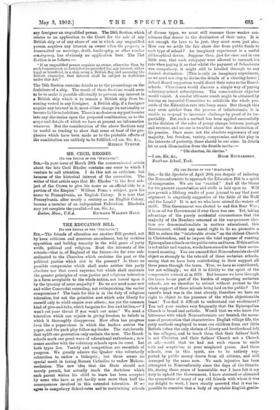THE EDUCATION BILL.
rro THZ EDITOR OP THE "SPECTATOR.") Sra,—The friends of education see another Bill greeted, not by keen criticism and generous amendment, but by reckless opposition and bulldog tenacity in the wild game of party strife, political and religious. Must the interests of the schools—that is, of England of the future—be for ever sub- ordinated to the Churches which enshrine the past or the political parties which riot in the present ? Is there no possible compromise which shall make neither this party absolute nor that creed supreme, but which shall maintain the greater principles of even justice and religious toleration in a form acceptable to the whole nation, not forced upon it by the tyranny of mere majority P Do we not need some new and wider Concordat extending, not extinguishing, the earlier compromises ? The basis for this is in the duty of religious toleration, but not the primitive sort which asks liberty for oneself only to wield empire over others ; nor yet the common kind of give-and-take, which bargains for live and let live,—" I won't cut your throat if you won't cut mine." We need a toleration which can rejoice in giving freedom to beliefs in which it thoroughly disapproves. How often has progress been like a paper-chase in which the leaders outrun the paper, and the pack play follow-my-leader. The watchwords that uplift one generation only enchain the next. The Board- schools mark one great wave of educational enthusiasm ; now comes another with the voluntary schools upon its crest. Let both types live. Variety and competition are essentials of progress. We greatly admire the Quaker who voluntarily subscribes to endow a bishopric ; but there seems no special merit in taxing Roman Catholics to endow Mahom- medanism The new idea that the State should not merely permit, but actually teach the doctrines which each parent wishes his child to learn has been accepted by some who have as yet hardly seen more than half the consequences involved in this extended toleration. If we agree to compulsory School-rates and to maintaining schools
of diverse types, we must still reassure those weaker con- sciences that demur to the destination of their rates. It is not enough for laws to be just, they must seem just also. How can we settle the fair share due from public funds to each type of school ? An imaginary experiment is a useful philosophical device. Suppose then, just for once and in one little area, that each ratepayer were allowed to earmark his rate when paying it, so that whilst the payment of School-rate was compulsory, it might still be labelled through to any desired destination. [This is only an imaginary experiment, so we need not stop to devise the details of a clearing-house.] School Board supporters would direct their rates to the Board- schools. Churchmen would discover a simple way of paying voluntary-school subscriptions. The conscientious objector would vanish. A similar ultimate result might be obtained by leaving an impartial Committee to subdivide the whole pro- ceeds of the Education-rate into lump sums. But though this may seem quicker than the process of infinitesimals, it is unable to respond to incessant challenge by proof of its im- partiality. But such a method has been applied successfully to the division of the sales of penny stamps between postage and revenue, and no one is troubled about the destination of his pennies. Once more, not the absolute supremacy of any majority, but freedom, variety, compromise, and fair play in the interests of posterity, these should be our aims. In details let us seek illumination from the fireside motto :—
"Ubi charitas, ibi claritas."










































 Previous page
Previous page